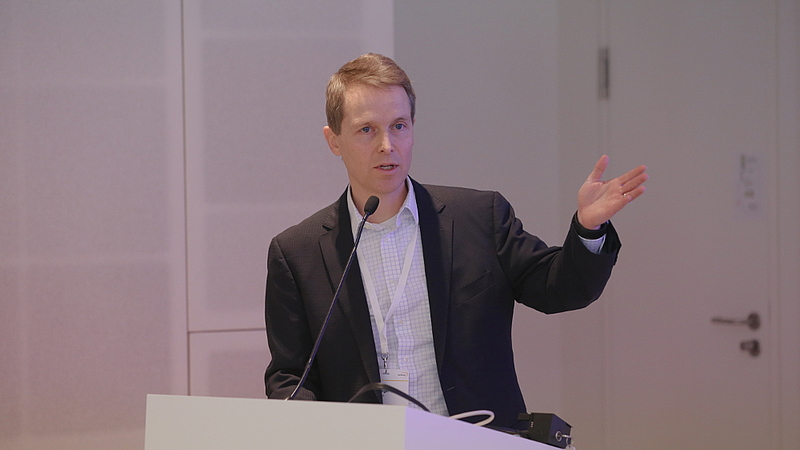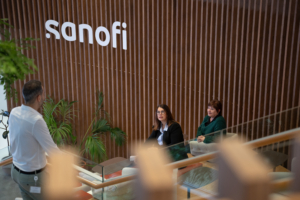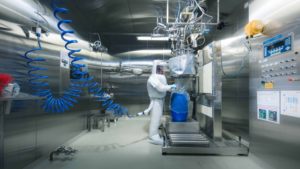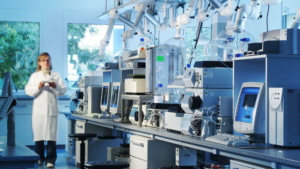
Making an impact on AMR R&D
At the 11th Berlin Conference, Novo Holdings outlined details of a new €135m investment fund launched to push the development of new drug classes urgently needed to fight antimicrobial resistance. European Biotechnology editors were the first to talk with Aleks Engel, Partner at Novo Holdings, and George Griffin, Chair of the Repair Impact Fund's Scientific Advisory Board, about the construction and the goal of the fund.
EuroBiotech_Most recently, Novo Holdings announced it will launch a new fund dedicated to the problem of antibiotic resistance. What are you planning, basically?
Engel_The initiative is called the Repair Impact Fund. Repair is an acronym and stands for Replenishing and Enabling the Pipeline for Anti-Infective Resistance. The fund is commissioned by the Novo Nordisk Foundation, which is a charitable fund based in Copenhagen, Denmark, with about US$50bn under management. The foundation has an asset management holding company called Novo Holdings, which invests exclusively in life sciences, and currently has 80 portfolio companies. Novo Nordisk Foundation has asked Holding to create and manage this fund. It will have an investment horizon of DKK1bn or €135m over three to five years and will support early-stage innovation targeting drug-resistant pathogens, particularly the priority pathogens defined by the CDC and the WHO lists.
EuroBiotech_So, which kind of pathogens will you focus on?
Engel_ The majority of the pathogens are Gram-negative. However, there are also some Gram-positive and some fungi on the list. When we say early stage, we are talking about lead optimisation through Phase I fully included. We have decided to fund programmes via investments, not grants, because we believe that the problem of a thin pipeline, to a large degree, is caused by a poor commercial outlook for these products. And we believe that, long-term, establishing a sustainable anti-infective therapy space and market place will require better commercial solutions. We have realistic expectations for our own returns, and that’s why it is an impact fund: our principal objective is to make an impact and accelerate therapies to the clinic and eventually to the market. But the investment angle, we believe, will help everybody to focus on the value these potentially life-saving products will create, and hopefully, over time, create a more sustainable situation for all of us. We in our organisation, because we have this prominent capital set-up, can invest for the very long term. So, we do not have a particular time frame for returns and that allows us to look into opportunities that may take a long time to realise. Through this €135m we expect that we can invest in about 20 different programmes. From traditional attrition of that, we would expect somewhere from two to five programmes to get through the end of Phase I and we hope to have at least one of such products eventually get to market.
EuroBiotech_Who will select the most interesting projects?
Engel_We have 10 members on our scientific selection board, chaired by George Griffin – 50% from the US and 50% from Europe – both from academia and industry. There are a bit more experts from industry because we wished to include people who have seen a lot of failures to pick the winners. Quite a few of the industry experts have previously worked in anti-infectives in Big Pharma. They have been instrumental in bringing those drugs to the market at some point in the past. Additionally, there are experts from SMEs contributing to the Scientific Advisory Board.
EuroBiotech_What are you looking for? How do you define a novel antimicrobial?
Griffin_There are very few new classes of antimicrobials being investigated at the moment. As Aleks said, this is due to all sorts of reasons, but investment by Big Pharma, particularly, is not strong. So the aim, really, is to get innovative ideas. Biotech, of course, is very strong in Europe and the US at the moment. There are some very good biotech companies, and I suspect that our board will start to look at novel ideas from biotech and choose which – in our scientific opinion – are the best bets. The way that we aim to do it is that there will be a call going out, which is going to be widely publicised. It’s impossible to say exactly how many will come in because this is new. But we certainly hope to see well in excess of 50 applications per semi-annual cycle. First, we’ll draw up a short-list. Then, we’ll meet at Novo for a couple of days to judge the short-listed applicants on their business cases, followed by interviews and presentations by the applicants. The final investment will be offered to the applicants who present the best evidence to this experienced team of biomedical and clinical experts.
Engel_Our investments have two flavours. One is a royalty-based investment, which means that we provide funding, and if the product eventually is successful, we would get a royalty from the sales at a point in the distant future. The other instrument is a convertible loan. Both of these are easier to handle than equity investments and we hope they will be attractive to companies that we get to interact with. Back to your question: What is a novel antimicrobial treatment? I think what we are targeting here are novel classes and novel modalities. We are certainly working for some diversity in our investments but, as I said, we don’t yet know what we will get. Obviously, there are many start-up enterprises in this field. Even though Novo Holdings has invested in eight anti-infective companies previously, we are looking to find out new places where science is leading us.
EuroBiotech_Which directions of AMR research have impressed you most, George?
Griffin_As bacteria are not clever, but highly adaptable through mutations that cause resistance, a novel way to prevent set-up of resistance is to use combinations. For example, there are very interesting things going on with drug candidates derived from the sea, producing new classes of antimicrobials. Also, antibodies may play a role in targeting highly resistant microorganisms, while approaches targeting the innate immune system are, in my view, in the very early stage. And we need to re-evaluate new therapies, such as phages. However, it’s a sort of approach I am sure the SAB will take. Currently, it looks like new classes are coming from biological sources, rather than from molecular design. We have to think about that.
EuroBiotech_How do you differentiate your work from other initiatives, such as Carb-X, Gardp, etc., as they are also targeting the early stage and looking for new classes of antimicrobials?
Engel_We are very much inclined to collaborate with all of them. I think what sets us apart is that we are, first of all, investing – as opposed to giving away grants. That probably, in some instances, could be seen as less attractive. On the other hand, we have some experience here that we think could be helpful through the people who we have on SAB and in our broader network. And we also believe that our ability and longevity to stay with the companies will be seen as attractive. We hope to have a positive commercial and impact-driven approach to accelerating these therapies.
EuroBiotech_Will the fund also include diagnostics that are required to be co-developed with targeted antimicrobials?
Engel_We may certainly include some diagnostics approaches, but will keep focussed on therapies.
Griffin_The partnership concept is what is really important because neither academia, or biotech, or Big Pharma on its own can now develop major new drugs. There has to be partnership, and then there has to be Phase I testing, and then clinical testing. So the way I look at it: as an experienced clinician and biomedical scientist who has worked with industry, I recognise that a continuum of professional expertise and knowledge is crucial in making the sort of advances we anticipate.
EuroBiotech_So is it correct to assume that your fund will be particularly targeting start-ups more than academic groups?
Engel_I think this relates to where they are in development. The earliest possibility is lead optimisation, which is typically beyond what is going on in the academic lab. So we would invest principally in companies and projects that are beyond the academic stage.
Griffin_My experience concerning biotech is that there is considerable collaboration with academia, because academics on their own have not the resources for full R&D, but they do have ideas. And those ideas, in collaboration with biotech and then Big Pharma, are very, very powerful.
EuroBiotech_ Is your fund completely independent, or are there any conditions that Novo Nordisk has the first right to license a funded project?
Engel_No conditions like that. We in Novo Holdings are completely independent from Novo Nordisk. Novo Nordisk is one of our 80 portfolio companies. We own 26% of it but it is not an antibiotic marketing company.
EuroBiotech_Have you thought about establishing a mechanism with other existing projects to bridge the valley of death developers of novel antimicrobial therapies will run into so long as antimicrobial development is not as commercially attractive as, say, oncology?
Engel_As a starting point, we believe that there is funding for projects for which you have proof-of-concept data, which means you have solid Phase I data. We have ourselves a venture capital group called Novo Ventures investing US$300-500m annually into many therapeutic areas. And we have invested in more than a handful of such companies at that stage and have made money in that area. So, we believe that a company with solid Phase I data has the opportunity to attract venture capital. It might not be the most attractive area because of the commercialisation and market problems mentioned. The objective of the Repair impact fund will be to get companies to that stage.
EuroBiotech_You mean extended Phase I trials providing early proof of concept?
Griffin_The different Phases have become blurred recently and a lot of people now think extended Phase I is a very good starting point. So, if you have the safety profile in humans, and you have in vitro efficacy, and may also have some early PK from the extended Phase I, that puts you in a very good position actually. Given the international perspective on the need for new drugs, the organisations will have no trouble getting through these things. As the medical need is so high, the regulatory authorities, whom I have been in discussions with, are thinking about establishing accelerated approval for the most urgently needed antimicrobials.
(First published in European Biotechnology, Spring Edition 2018)


 ©FabienMalot
©FabienMalot Lonza Group
Lonza Group Vetter Pharma
Vetter Pharma